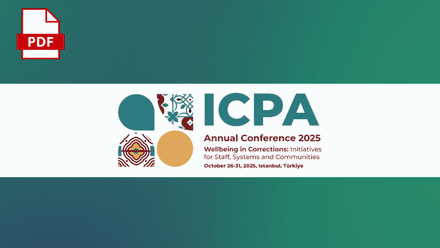ICPA2023-PID040 - Kelsey Engstrom and Tom Eberhardt
Transformative change in U.S. prisons requires prison staff buy-in. Amend’s introductory trainings aim to engage staff by focusing on core international correctional principles and practices (e.g. dynamic security, normalization, a professionalized workforce) through the lens of the occupational health crisis in U.S. prisons. The training aims to impart knowledge and inspire participant engagement in transformative change. This study is a descriptive analysis of post-training surveys (n=350) administered to staff at three prisons in a U.S. state who participated in an introductory training between April 2022 and April 2023.
Participants overwhelmingly reported learning something valuable (87.5%), believing that their colleagues would benefit from the training (90%), and that implementing these principles would improve their job satisfaction (86%), overall health and wellness (89%) and outcomes for incarcerated people (88%). Respondents stated that they would use this training in their work by changing how they interact with incarcerated people to be more humanizing and encouraging other staff to alter their treatment of incarcerated people. Participants appreciated the training’s focus on staff health and wellness, learning international best practices that were new to them and approaches to their work, and the safe space the training offered to express concerns. Respondents suggested the training could be improved by integrating more evidence of the effectiveness of dynamic security and normalization, offering additional hands-on training, and continuing to focus on staff empowerment. Participants called for facility leadership to empower and support staff interested in adopting these principles and practices.
This evaluation found that participants gained new knowledge, improved their attitudes about incarcerated people, and set practice change intentions from this introductory training. The training’s focus on staff wellness and empowerment engaged participants in learning the material, asking questions, and seeking change. Participants reported appreciating the new ideas and international perspectives offered, having open discussions, and the acknowledgement of unique challenges and needs of their facilities. As prison culture change initiatives develop across the U.S. and around the world, this evaluation offers insight into the experiences of prison staff at the outset of a culture change program.
One of the greatest challenges of engaging correctional professionals in culture change is connecting the transformation to the personal benefits they will experience as a result (e.g. improved job satisfaction and health). Empowering frontline staff to see the “what’s in it for me” and meaningfully contribute to culture change efforts is essential to success.

